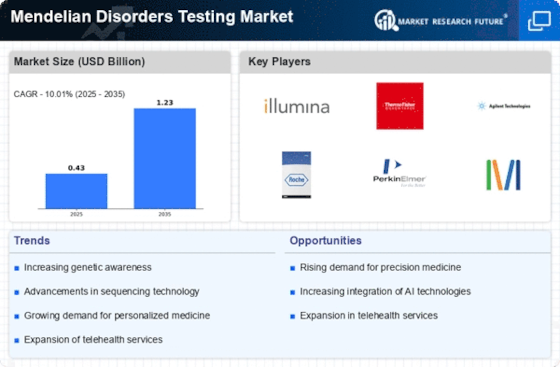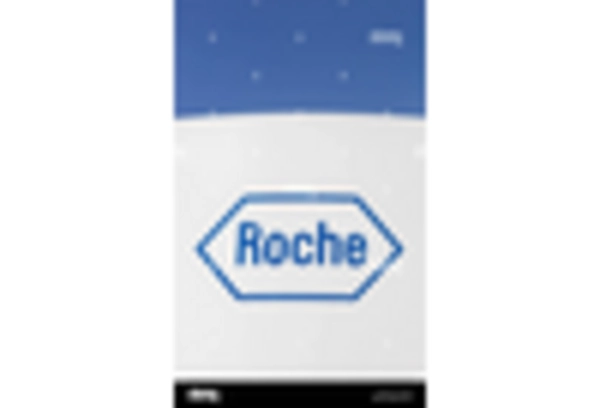Market Share
Mendelian Disorders Testing Market Share Analysis
The market dynamics of Mendelian Disorders Testing unfold within a framework influenced by scientific advancements, healthcare needs, and the pursuit of more personalized and precise diagnostics. Mendelian disorders, characterized by genetic mutations inherited in a straightforward manner, present a unique challenge in healthcare. The growing awareness and understanding of the genetic basis of these disorders have propelled the Mendelian Disorders Testing market into a phase of dynamic evolution. One key driver of this market is the expanding knowledge of the genetic underpinnings of various inherited conditions, leading to an increased demand for genetic testing to identify and manage Mendelian disorders.
Technological progress in genomics plays a pivotal role in shaping the market dynamics of Mendelian Disorders Testing. The advent of next-generation sequencing (NGS) technologies has revolutionized genetic testing, enabling the rapid and cost-effective analysis of a broad range of genetic variations. NGS allows for the simultaneous screening of multiple genes associated with Mendelian disorders, facilitating more comprehensive and accurate diagnostics. This technological leap has significantly broadened the scope and accessibility of Mendelian Disorders Testing, providing healthcare professionals with powerful tools for early detection, accurate diagnosis, and targeted treatment planning.
Collaborations and partnerships among research institutions, healthcare providers, and biotechnology companies contribute to the dynamic landscape of the Mendelian Disorders Testing market. These alliances foster the exchange of knowledge, facilitate large-scale genetic studies, and drive innovation in testing methodologies. The collaborative efforts aim to enhance the understanding of genetic variants, refine testing algorithms, and develop standardized approaches for the diagnosis and management of Mendelian disorders. The synergy between different stakeholders accelerates the translation of genetic discoveries into practical applications within the clinical setting.
The pharmaceutical industry's engagement in the development of targeted therapies for Mendelian disorders also shapes market dynamics. As the genetic basis of these disorders becomes clearer, pharmaceutical companies invest in research and development to create therapeutic interventions that address the underlying genetic defects. The parallel progress in both diagnostics and treatment options reflects a holistic approach to managing Mendelian disorders, promising improved patient outcomes and quality of life.
Regulatory frameworks play a critical role in guiding the market dynamics of Mendelian Disorders Testing. Regulatory agencies ensure that genetic tests meet rigorous standards for accuracy, reliability, and clinical utility. The regulatory landscape aims to strike a balance between facilitating innovation and safeguarding patient safety, promoting the responsible development and deployment of genetic testing technologies.
Market dynamics are also influenced by the increasing emphasis on personalized medicine. The individualized nature of Mendelian disorders necessitates tailored approaches to diagnosis, treatment, and genetic counseling. Genetic testing enables healthcare providers to offer personalized insights into a patient's genetic makeup, empowering informed decision-making and optimizing patient care. The integration of personalized medicine principles into healthcare practices further propels the adoption of Mendelian Disorders Testing.
Economic factors, including healthcare spending, reimbursement policies, and patient access to testing, contribute to the market dynamics. The economic feasibility of genetic testing and the availability of reimbursement options influence the widespread adoption of Mendelian Disorders Testing within healthcare systems. As stakeholders seek cost-effective solutions that align with economic considerations, the market responds by striving to deliver value-based genetic testing services for individuals at risk of or affected by Mendelian disorders.


















Leave a Comment